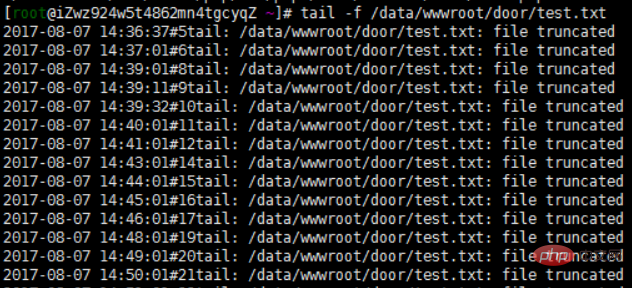本篇文章介绍了使用ThinkPHP实现定时任务的方法,和cron实现定时任务的方法,希望对学习thinkphp的朋友有帮助! ThinkPHP实现定时任务案例 定时任务常见的是Linux中的crontab定时任务,这种是

ThinkPHP实现定时任务案例
定时任务常见的是Linux中的crontab定时任务,这种是通过编写脚本来执行的,它会在后台一直循环执行。但是有时候我们没有服务器权限或者说我们没有独立的服务器,那又该怎么办?其实,定时任务还有一种就是被动是,只要访问项目就会触发,被动式定时任务一般用于虚拟主机,因为没有服务器权限我们只能通过代码来实现。下面我们以thinkPHP为例来分析这两种定时任务的区别。
(推荐教程:thinkphp教程)
被动式定时任务
①、tags.php
在/Application/Common/Conf目录下新建tags.php文件。(此和方法一处一样)
<?php
return array(
//'配置项'=>'配置值'
'app_begin' =>array('Behavior\CronRunBehavior'),
);②、crons.php
在/Application/Common/Conf目录下新建crons.php文件。(此处和方法一有区别,注意区分。)
<?php
return array(
//myplan为我们计划定时执行的方法文件,2是间隔时间,nextruntime下次执行时间
//此文件位于/Application/Cron/目录下
'cron' => array('myplan', 2, nextruntime),
);③、myplan.php
在/Application/Common/目录下新建 Cron文件夹,里面新建文件myplan.php文件。
<?php
echo date("Y-m-d H:i:s")."执行定时任务!" . "\r\n<br>";此时我们就可以访问项目的url,然后我们会发现在Application/Runtime/目录下生成了~crons.php文件,同时页面出现如下效果,文件内容如下:
<?php
return array (
'cron' =>
array (
0 => 'myplan',
1 => 2,
2 => 1502089802,
),
);
?>
主动式定时任务
①、登录Linux服务器
[root@iZwz924w5t4862mn4tgcyqZ ~]# crontab -e */1 * * * * /usr/local/php/bin/php /data/wwwroot/door/test.php//执行PHP文件 */1 * * * * /usr/bin/curl http://www.100txy.com/wechatapi.php//访问url
②、编辑test.php
<?php
$txt = "/data/wwwroot/door/test.txt";
// die(var_dump($txt));
$date=date('Y-m-d H:i:s',time());
$content = file_get_contents($txt);
if($content!=''){
$arr=explode('#',$content);
$num=$arr['1']+1;
$string=$date.'#'.$num;
}else{
$string=$date.'#'.'1';
}
file_put_contents($txt,$string);
$content_last = file_get_contents($txt);
return $content_last;③、后台监测test.txt文件
[root@iZwz924w5t4862mn4tgcyqZ ~]# tail -f /data/wwwroot/door/test.txt

(免费学习视频教程分享:php视频教程)
以上就是ThinkPHP实现定时任务案例的详细内容,更多请关注自由互联其它相关文章!
